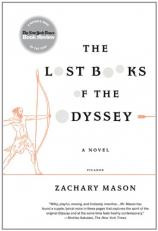Reading Group Guide
Discussion Questions
The Lost Books of the Odyssey

1. The novel’s preface, delivered in the voice of a classics scholar, states that the forty-four variations “omit stock epic formulae in favor of honing a single trope or image down to an extreme of clarity.” How would you define that single trope? Which of the novel’s recurring images do you consider to be the most haunting?
2. The opening segment captures the power of the gods to inflict harm and to obscure reality. How do the characters respond to a world in which everyday life might be a mere illusion? Should we feel confident in reality?
3. How would you characterize the bond between Athena and Odysseus? What power do they wield over each other? What is unique about Zachary Mason’s approach to the relationships between gods and mortals?
4. Discuss the many versions of Telemachus presented in The Lost Books of the Odyssey. What facets of father-son relationships are presented?
5. What accounts for the endurance of tales related to the Trojan War? Why might the author have included a passage devoted to Alexander, and a medieval chapter (“Record of a Game”)? How does Mason’s approach compare to recent films inspired by Homer’s epics?
6. Consider the Odyssean aspects of reading this novel. How did you experience the multiple “guides” who led your journey? Which narrators did you prefer? What is the effect of the footnotes, and the premise that these chapters are translated from “pre-Ptolemaic papyrus excavated from the desiccated rubbish mounds of Oxyrhynchus”?
7. What do Penelope and Helen each reveal about the nature of marriage? How devoted would you have been to your husband if you had been dealt the fate of these women?
8. What images of Homer himself are presented within the text? How might he have reacted to Mason’s inventions?
9. How does Agamemnon’s rule as king compare to that of contemporary political and military leaders?
10. What truths about aging and wisdom are presented in the novel? How does the author balance a modern approach with the ancient mind-set of Troy’s defeat and its aftermath?
11. The author applied his expertise as a computer scientist to the broad structure of the novel. What other 21st century techniques are evident? What was lost and gained by cultures whose storytelling mostly consisted of lyric poetry in an oral tradition?
12. Discuss the many versions of warriors who are presented in the novel, including Achilles’s appearance as a golem killing machine. How did ancient societies define “hero”? Does the Homeric impetus for war --- a manifestation of meddling on the part of deities --- appear, in some way, in modern discourse on war?
13. Which aspects of Homer’s Iliad and Odyssey were you most familiar with before reading this novel? Which reinventions by Mason amused you the most?
14. In the world of The Lost Books of the Odyssey, how does life for the female characters (gods and mortals alike) compare to that of men? What double standards exist? What surprisingly progressive ideals are in place?
15. What connections between the stories are evident? What threads are woven into the characters’ recurring struggles?
16. For centuries, Troy was considered to be a locale invented for ancient legends, but nineteenth-century excavations in Turkey confirmed the likely site of the walled city. Does the truth about the Trojan War matter? Is it all right to exchange accuracy for drama, delivering a rousing war story that makes its heroes immortal?
The Lost Books of the Odyssey
- Publication Date: January 4, 2011
- Genres: Fiction
- Paperback: 240 pages
- Publisher: Picador
- ISBN-10: 0312680465
- ISBN-13: 9780312680466







